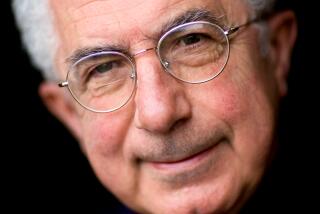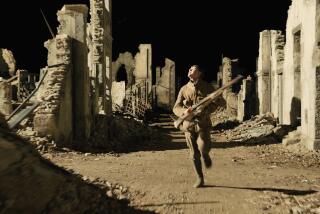Who Wrote <i> the </i> Book on War? : Carl von Clausewitz’s Old Military Theories Still Apply, Scholars Say
- Share via
As military strategists go, Carl von Clausewitz might appear to be as relevant to the Persian Gulf War as Dr. Strangelove.
He’s the last guy you would expect to be today’s war analyst of choice, but his name is repeatedly dropped in columns, speeches and sound bites--not to mention in cocktail party chatter from California to Capitol Hill. Even Gen. Colin Powell, chairman of the Joint Chiefs of Staff, dragged out von Clausewitz’s most famous statement, that war “is merely the continuation of policy by other means.”
It doesn’t seem to matter that von Clausewitz is dead. Has been for nearly 160 years. A Prussian officer, he fought with the Russians against Napoleon back when muskets were the high-tech weaponry of the day.
His books, which don’t even tell you how to win a war, are hard to find and even more difficult to read. You won’t find his seminal “On War” on the bookshelf of your local B. Dalton or Waldenbooks. Don’t even think about wasting your time looking for it at most college bookstores. It’s not even stocked at those of USC or UCLA.
And when you finally track down a copy of the thoroughly dense von Clausewitz classic, you’ll still find many of the examples in its 711 pages dated, if not on the obvious side. Consider this gem: “A march of 500 miles or more will always cause an army to arrive at its destination in a highly weakened condition, especially where horses and wagons are concerned.”
On top of all this, von Clausewitz writes of the metaphysics of battle, the significance of the intangible stuff: will, mind-set, courage, morale. Not just for the soldiers and commanding officers in the field, but for their political leaders and fellow countrymen.
So why is von Clausewitz the war philosopher frequently quoted by everyone from editorial writers to allied commanders to Jeane Kirkpatrick?
Why did sales of the most recent English translation of “On War” (Princeton University Press) double in January?
In short, why is this dead, hard-to-decipher, metaphysically inclined Prussian suddenly so hot?
“I’ve been trying to explain that myself,” says John Keegan, a London-based author who is widely considered to be one of the world’s leading military historians.
“I think it’s because nobody’s taken the trouble to improve on Clausewitz very much. He wrote a brilliant presentation of the obvious,” adds Keegan, who also works as a correspondent for the London Daily Telegraph.
Yale University history professor Michael Howard, who is far more enamored of von Clausewitz than Keegan and went to the trouble of editing and translating “On War,” with Peter Paret, for Princeton University Press, argues that von Clausewitz’s work remains “clear, coherent and relevant.”
Might the U.S. military, where von Clausewitz is said to have his greatest number of followers, be secretly enamored of von Clausewitz’s metaphysical considerations?
Howard doubts it. He and others like to point out that von Clausewitz’s notions are ultimately practical. And that his usefulness--and timelessness--lies in the fact that he taught people how to think about war, rather than what to think about it.
For example, von Clausewitz contended that war is a battle of wills as much as it is a battle of physical forces. He argued that will doesn’t compensate for everything, but it is key. True victors, he theorized, use force to destroy the will of their opponents, not merely to wipe out their troops (though troop decimation can be quite useful in the destruction of will).
And in the von Clausewitzian scheme of things, all parts of a “trinity” play significant roles in war: a country’s political leadership, which sets the goals; the military, which carries out the goals, and the people, who support the goals.
These theories, especially the notion that a successful war requires the support of a country’s citizens, are sometimes used to explain why the United States failed so miserably in the Vietnam War, despite its pre-eminent military resources.
“After the Vietnam War, people said, ‘How could this have possibly have happened to us?’ In quantifiable terms, there was no match. We were very superior to the North Vietnamese,” observes Harry G. Summers Jr., a retired Army colonel and author of “On Strategy,” a highly regarded analysis of the Vietnam War that explains the conflict in terms of von Clausewitzian theory. According to many, Summers’ book introduced many to the philosopher.
During the Vietnam War, von Clausewitz’s ideas on the importance of morale and courage and psychology were not very popular, Summers recalls. “We were more comfortable with quantified, engineering approaches to war. But after Vietnam, the Naval War College started looking into von Clausewitz. . . . And ironically, since ‘On War’ deals mostly with land warfare, then the Army War College picked it up to look at where we went wrong in Vietnam.”
Many von Clausewitz scholars agree--but they doubt whether many people have actually invested the time in reading and understanding von Clausewitz beyond a few one-liners yanked from the first chapter of “On War” or borrowed from the popular references of others.
“People refer to Clausewitz, but I can’t believe that they’ve read him,” speculates Paret, the co-editor of “On War.” The Mellon Professor in the Humanities at the Institute for Advanced Study in Princeton, N.J., Paret is the scholar Howard calls the foremost authority on von Clausewitz.
But even Paret insists he is puzzled by the sudden attraction, if only superficial, to von Clausewitz.
“It’s a very good question. It happens every time there’s a major war. Some people seem to want the assurance of a classic. He does seem to have something to say to this generation.
“But I’ve often wondered why people refer to Clausewitz, because I think that most people don’t have the patience or the time to devote to this rather difficult book,” Paret contends.
“In order to really understand it, you have to know a certain amount of history, which most people don’t have. I don’t really know that Clausewitz is popular. He’s mentioned now and then, but very few people have read him. I think it’s one of those intellectual fads that comes and goes.”
Among the factors likely to deter most people from investigating von Clausewitz’s work, Paret notes, is that the philosopher was not interested in providing precepts on how to win a war: “His purpose is really to try to understand the nature and dynamic of war and armed conflict, not how to win, but what is this all about.”
Michael Handel, a von Clausewitz expert who is editor of the Journal of Intelligence and National Security and a professor affiliated with the Harvard Center for International Affairs, agrees: “When people read Clausewitz, especially military people, they look for a recipe. But his brightness is that he gives you no answers. He only asks questions. He makes you think.
“He wrote the single most outstanding book about war. Clausewitz is so important because he emphasizes that war is dominated by friction, that it’s a tricky business. It’s easy to know how it begins, but once the first move has been taken all that follows is clouded by uncertainty, by friction, by chance.”
In Handel’s view, von Clausewitz’s emphasis on the role of uncertainty in war was his most important contribution.
“We rarely are in control of even a small number of the forces involved,” he explains. “When military people plan for war, they know what they plan but they don’t necessarily know what the enemy plans. It’s like a marriage in a way. When you deal with conflicting wills, conflicting forces, planning is very short-lived when it’s faced by reality.”
Like, say, the reality that ensues when it’s time to put down the books and go to war?
“In my opinion, Clausewitz has never influenced the actual conduct of war,” Paret insists. “I don’t think that makes him any less important or interesting. ‘On War’ was a magnificent intellectual achievement. But I would compare him to someone like De Tocqueville.
“De Tocqueville is read and quoted, but nobody would say he’s been an influence in the development of American democracy. Even though people read and quote him, he has not affected the way people act as politicians.”
IN THE WORDS OF CLAUSEWITZ
“War is not merely an act of policy but a true political instrument, a continuation of political intercourse, carried on with other means.”
“If you want to overcome your enemy, you must match your effort against his power of resistance, which can be expressed as the product of two inseparable factors . . . the total means at his disposal and the strength of his will.”
“Even the ultimate outcome of a war is not always to be regarded as final. The defeated state often considers the outcome merely as a transitory evil, for which a remedy may still be found in political conditions at some later date.”
“The objective nature of war makes it a matter of assessing probabilities. Only one more element is needed to make war a gamble--chance: the very last thing that war lacks. No other human activity is so continuously or universally bound up with chance. And through the element of chance, guesswork and luck come to play a great part in war.”
“The element in which war exists is danger. The highest of all moral qualities in time of danger is certainly courage. Now courage is perfectly compatible with prudent calculation, but the two differ nonetheless, and pertain to different psychological forces. Daring, on the other hand, boldness, rashness, trusting in luck are only variants of courage, and all these traits of character seek their proper element--chance.”
--From “On War” by Carl von Clausewitz, edited and translated by Michael Howard and Peter Paret
More to Read
Sign up for our Book Club newsletter
Get the latest news, events and more from the Los Angeles Times Book Club, and help us get L.A. reading and talking.
You may occasionally receive promotional content from the Los Angeles Times.










